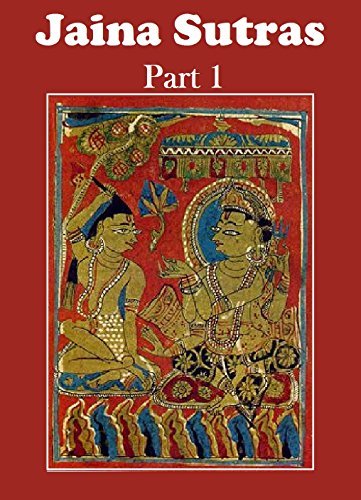Acaranga-sutra
by Hermann Jacobi | 1884 | 71,211 words | ISBN-10: 8120801237 | ISBN-13: 9788120801233
The English translation of the Acaranga Sutra, which represents the first the 12 Angas in Shevatambara Jainism. It is traditionally dated to the 5th-century BCE and consists of two parts containing lectures based on the teachings of Mahavira. Topics include: lifestyle of an ascetic: conduct, behavior, collecting alms, clothes, mode of walking and ...
Lecture 11
[Eleventh lecture (uddesaya, uddeśaka): Lecture on Sounds (saddasattikkayam)]
A monk or a nun should not resolve to go where they will hear sounds of a Mṛdaṅga, Nandīmṛdaṅga, or Jhallarī[1], or any such-like various sounds of drums. (1)
If a monk or a nun hear any sounds, viz. of the Viṇā, Vipamcī, Vadvīsaka, Tuṇaka, Paṇaka, Tumbavīṇikā, or Dhaṃkuṇa, they should not resolve to go where they will hear any such-like various sounds of stringed instruments. (2)
The same precepts apply to sounds of kettledrums, viz. of the Tāla, Lattiyā, Gohiyā[2], or Kirikiriyā; (3) Also to sounds of wind instruments, viz. the conch, flute, Kharamukhī, or Piripiriyā. (4)
A[3] monk or a nun should not, for the sake of hearing sounds, go to walls or ditches, &c. (see II, 3, 3, §§ 1 and 2); (5)
Nor to marshes, pasture grounds, thickets, woods, strongholds in woods, mountains, strongholds in mountains; (6)
Nor to villages, towns, markets, or a capital, hermitages, cities, halting-places for caravans; (7)
Nor to gardens, parks, woods, forests, temples, assembly halls, wells; (8)
Nor to towers, pathways, doors, or town gates; (9) Nor where three or four roads meet, nor to courtyards or squares; (1o)
Nor to stables (or nests) of buffaloes, cattle, horses, elephants, &c. (see 10, § 12); (11)
Nor to places where buffaloes, bulls, horses, &c., fight; (12)
Nor to places where herds of cattle, horses, or elephants are kept; (13)
Nor to places where story-tellers or acrobats perform, or where continuously story-telling, dramatical plays, singing, music, performance on the Viṇā, beating of time, playing on the Tūrya, clever playing on the Paṭaha is going on; (14)
Nor to places where quarrels, affrays, riots, conflicts between two kingdoms, anarchical or revolutionary disturbances occur; (15) Nor to places where a young well-attended girl, well-attired and well-ornamented, is paraded, or where somebody is led to death. (16)
A monk or a nun should not, for the sake of hearing sounds, go to places where there are many great temptations[4], viz. where many cars, chariots, Mlecchas, or foreigners meet. (17)
A monk or a nun should not, for the sake of hearing sounds, go to great festivals where women or men, old, young, or middle-aged ones are well-dressed and ornamented, sing, make music, dance, laugh, play, sport, or give, distribute, portion or parcel out plenty of food, drink, dainties, and spices. (18)
A monk or a nun should not like or love, desire for, or be enraptured with, sounds of this or the other world, heard or unheard ones, seen or unseen ones.
This is the whole duty, &c.
Thus I say. (19)
Footnotes and references:
[1]:
These are different kinds of drums.
[3]:
The beginning, 'If a monk or a nun hear particular sounds somewhere, viz.,' and the end, 'they should not resolve to go to suchlike or other places for the sake of hearing sounds,' are in the text repeated in all, §§ 5-16. In the translation the text has been somewhat Abridged.
[4]:
Mahāsava, mahāsrava. The word has probably here the original meaning, conflux; or mahāsava is a mistake for mahosava, which would be identical with mahussava, great festivals, in the next paragraph.
